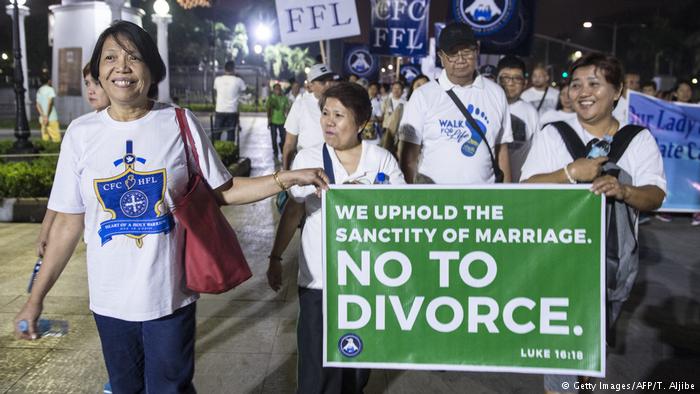Immigrants who want PH divorce: ‘I deserve happiness’
In her off-shoulder wedding gown, Tryphena (not her real name) was radiant. Beside her was the dashing groom. Looking at the photo, Tryphena, a Canadian citizen, says that everything seemed surreal, just like a photo-shoot in a verdant garden. It has been 20 since they exchanged “I do’s” in a Catholic rite in the Philippines. Now a single-parent in Canada, raising three sons, she separated from her husband on September 20, 2017 because of his drug addiction, which led to verbal and violent abuses.
Patricia (not her real name), a nutritionist in a California hospital, was blissfully married for three years to a Korean-American twice her age, but the union failed due to “irreconcilable differences.”
Meanwhile, in Thailand, Nancy Catane and Eugenia Mallari are eagerly waiting for divorce to become law in the Philippines.
Nancy has been separated from her husband for 10 years. The husband has been living with another partner for six years now in the Philippines. Mallari’s husband, although living with their two grown-up kids, has a live-in partner and has a new child already.
Failed relationships
Infidelity is the primary reason why marriage like Eugenia’s fails. She discovered that her husband had been keeping girlfriends at her expense. Despite this, Eugenia tried to keep the marriage for the sake of the kids. But in one of their arguments, her husband almost killed her, prompting her to file a complaint with the police. She left the Philippines because her husband pushed her to do so, perhaps so he could continue philandering.
“I have no reason to stay in the marriage. My kids agree with me because they witnessed the abuses,” Eugenia says.
Tryphena and Nancy claim that vices killed their marriage.
“My husband was a seaman. But after his contract, he spent time in the cock derby, instead of working,” Nancy says.
Yet, it took three years before Nancy decided to separate from her husband. Nancy’s parents are the guardians of their kids.
“Although we have been sleeping separately for six years, I could still tolerate my husband. But he started hitting my sons, it was then and there that I decided to leave him,” Tryphena says.
Patricia dreamed of a big family. But her ex-husband did not agree.
“Due to his age, he did not want to raise kids. We decided to split up due to irreconcilable differences, which include age and personal goals,” Patricia explained.
Is divorce the only way out?
On March 12, the Philippine Congress approved the final reading of HB No. 7303 or the Absolute Divorce and Dissolution of Marriage.
Rev. Edwin Gariguez, Executive Secretary of National Secretariat for Social Action (NASSA), the advocacy and social development arm of the Catholic Bishops’ Conference of the Philippines (CBCP), said that the Church remains in its stand against divorce, despite the more liberal approach of Pope Francis on marriage, family life, and the LGBT community.
In Amoris Laetitia, Pope Francis declares:
Marital problems are “often confronted in haste and without the courage to have patience and reflect, to make sacrifices and to forgive one another. Failures give rise to new relationships, new couples, new civil unions, and new marriages, creating family situations which are complex and problematic for the Christian life”.
Instead the Pontiff calls on states to pass laws and create work to ensure the future of young people and help them realize their plan of forming a family.
“Divorce should not be an easy way out of a difficult relationship. The problem about divorce is when it is seen as the panacea for everything that is bad or not working in marriage or family relationship,” writes the Pope.
The Catholic Church has two options for spouses in ‘inharmonious relationships’: annulment and legal separation.
“Annulment can be invoked in cases of really dysfunctional relationship, such as abuses, and there are also psychological incapacities as in civil law,” Gariguez said.
In an annulment, the Church’s premise is that there was no marriage contracted at all because of the incapacity of any or both parties to contract a valid marriage. The conditions must be present at the time of marriage. Annulment is filed in the Diocese where the couple lives. It will be decided by Canon lawyers and the decision forwarded to the Appellate Matrimonial Tribunal. Lay persons such as psychologists and doctors are also sought for their expertise. The process takes one year. During his recent visit to the Philippines, Pope Francis said that annulment should be cost-free or not prohibitive to ordinary people.
However, for a remarriage to be considered legal, civil annulment is also needed. Gariguez explained that Catholics who wish to remarry in a Catholic rite must have Church annulment.
Under the Article 55 of the Family Code of the Philippines, spouses can file for legal separation in the Family Court on various grounds prescribed by the Code, including infidelity, abuses, homosexuality, and drug addiction. A legally separated couple cannot remarry unless one of the spouses dies.
If the Divorce Bill becomes law in the Philippines, the same reasons for annulment and legal separation under the Family Code applies; but they include reasons such as gender reassignment surgery and separation of the spouses for at least five years. The bill also allows a “cooling off period,” when the spouses can consider reconciliation.
OFWs like Nancy and Eugenia will be given priority in filing a petition.
‘I deserve happiness’
“My kids dreamed of a complete family. Despite verbal abuses and suffering in silence, I tried to keep the family intact. But it’s different when he started hitting my sons,” Tryphena said.
After 90 days of living separately, Tryphena, applied as a single-parent at the Canadian Revenue Agency (CRA) to qualify for benefits. Since their marriage in the Philippines is recognized in Canada, and her husband is a permanent resident, she can apply for a divorce after one year of separation. It will take less than a month for the finalization of the divorce. Tryphena can remarry in Canada. But both of them cannot remarry in the Philippines, especially her husband, who remains a Filipino citizen.
“If I had decided to leave my husband earlier, I would have been happier a long time ago,” Tryphena said.
Since Eugenia and Nancy’s husbands are raising their own families with their live-in partners, the two believe that only a divorce can give them absolute freedom to find their own life partners.
Rev. Gil Alejandria, a missionary Catholic priest concurs but continues to disagree with divorce.
“Divorce gives them a second chance to be happy, and to make a hopefully better choice of partner. But on the negative side, children grow up having no concept of a lasting union or the need to save a marriage.”
Patricia does not recommend it for everyone, due to the psychological toll to both parties and to their families as well. She and her ex remain friendly.
Age and financial capability are not necessarily important factors in a successful marriage, but serious commitment is. If divorce is legislated in the Philippines, Nancy believes that people will be more careful in getting married.



